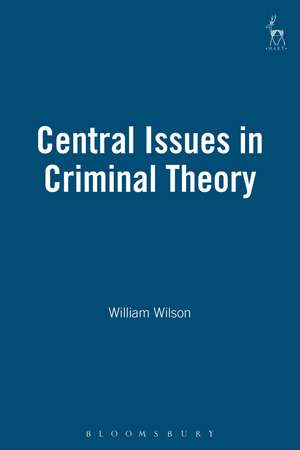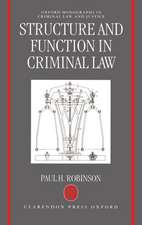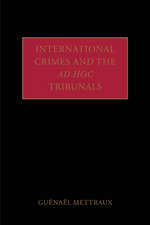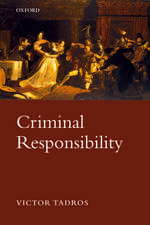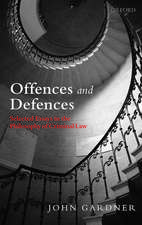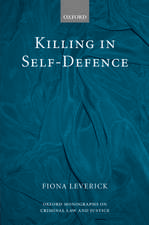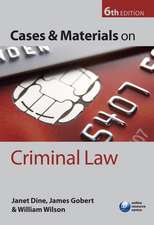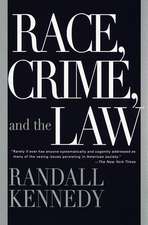Central Issues in Criminal Theory
Autor William Wilsonen Limba Engleză Paperback – 11 noi 2002
Preț: 259.79 lei
Nou
Puncte Express: 390
Preț estimativ în valută:
49.72€ • 51.59$ • 41.55£
49.72€ • 51.59$ • 41.55£
Carte tipărită la comandă
Livrare economică 17-31 martie
Preluare comenzi: 021 569.72.76
Specificații
ISBN-13: 9781841130620
ISBN-10: 1841130621
Pagini: 384
Dimensiuni: 138 x 216 x 19 mm
Greutate: 0.48 kg
Editura: Bloomsbury Publishing
Colecția Hart Publishing
Locul publicării:London, United Kingdom
ISBN-10: 1841130621
Pagini: 384
Dimensiuni: 138 x 216 x 19 mm
Greutate: 0.48 kg
Editura: Bloomsbury Publishing
Colecția Hart Publishing
Locul publicării:London, United Kingdom
Caracteristici
The book gives an account of the present state of criminal theory in an accessible style which will welcomed by those embarking upon courses in advanced criminal law and criminal theory, teachers, and more generally by practitioners and scholars
Notă biografică
William Wilson is a Professor of Criminal Law at Queen Mary, University of London.
Cuprins
1 Criminalising Wrongdoing 2 Punishing Wrongdoing3 Criminal Wrongdoing: Acts and Omissions4 Criminalising Wrongdoing: Voluntariness5 Intention, Motives and Desert6 Causing Harm 7 Attributing Liability to Secondary Parties8 Criminal Attempts9 Packaging Criminal Liability10 Criminal Defences: Setting Limits to Justifications 11 Excusing Wrongdoing: Capacity and Virtue
Recenzii
...astounding wealth of arguments discussed and the astuteness and brilliance of the analysis...
Wilson has produced a book that is relatively small but that addresses the basic questions in a logical and coherent manner. Indeed, one of the author's considerable strengths is his ability to explain particularly intricate and often obscure points in simple, comprehensible language. The way in which each chapter begins with a general introduction to the topic, identifying the important issues, is helpful in this regard.
Wilson's book is a thoughtful contribution to the developing field of theoretical writing about the criminal law.
In this engaging, well-written book, William Wilson explores the classic internal questions thrown up by criminal law doctrine. These include the principles underlying the decision to criminalise some behaviour and the nature of punishment, as well as the issues identified as central by many writers since Glanville Williams first published Criminal Law: The General Part 50 years ago.
The book is well-written, the author has read widely, and the explanation of the positions of the commentators is very good.. . . In sum, the book provides a decent explanation of the position of theory in academic Criminal Law at the start of the twenty-first century, it could be used in undergraduate courses on Criminal Law and it is suited to be a textbook on more advanced, more theoretical, Criminal Law modules. It is also an exemplar of the coming of age of theoretical perspectives in Anglo-Welsh Criminal Law.
Wilson has produced a book that is relatively small but that addresses the basic questions in a logical and coherent manner. Indeed, one of the author's considerable strengths is his ability to explain particularly intricate and often obscure points in simple, comprehensible language. The way in which each chapter begins with a general introduction to the topic, identifying the important issues, is helpful in this regard.
Wilson's book is a thoughtful contribution to the developing field of theoretical writing about the criminal law.
In this engaging, well-written book, William Wilson explores the classic internal questions thrown up by criminal law doctrine. These include the principles underlying the decision to criminalise some behaviour and the nature of punishment, as well as the issues identified as central by many writers since Glanville Williams first published Criminal Law: The General Part 50 years ago.
The book is well-written, the author has read widely, and the explanation of the positions of the commentators is very good.. . . In sum, the book provides a decent explanation of the position of theory in academic Criminal Law at the start of the twenty-first century, it could be used in undergraduate courses on Criminal Law and it is suited to be a textbook on more advanced, more theoretical, Criminal Law modules. It is also an exemplar of the coming of age of theoretical perspectives in Anglo-Welsh Criminal Law.
Descriere
This book questions whether one of the tasks of criminal theory is to set goals and identify deficiencies in order to improve rules and procedures.
